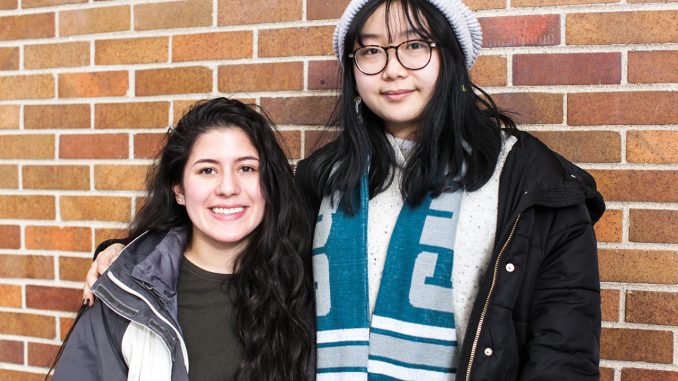
In 2014, Sonali Udaybabu grabbed her video camera and headed into the streets of Delhi, India, to participate in a youth-led protest.
The non-violent campaign, named “Kiss of Love,” protested right-wing groups that police public displays of affection in India.
Udaybabu, a first-year master’s of film and media arts student, turned her footage of the protest into a short documentary film, “The Kiss of Love.”
“I hope that after the film people [will want] to talk to me about what was happening,” said Udaybabu, who is an Indian citizen and a queer feminist activist. “I think that is the most crucial thing about this film. It will bring attention to the issues in the world.”
The film will be shown at Temple’s second annual Women’s Fest on Wednesday.
The festival, which starts at 5 p.m. at the Temple Performing Arts Center, consists of 12 student-produced short films that feature a woman writer, director or cinematographer.
The festival is a collaborative work between Diamond Screen Film Series, and Mise-en-Femme Productions, a student film organization.
Film and media arts graduate students Qiyue Sun and Jon Appel collaborated with senior film and media arts majors Mohammad Ibrahim and Gabriella Bajaña to organize the Women’s Film Fest. Sun, Appel and Ibrahim represent Diamond Screens, while Bajaña represents Mise-en-Femme.
“Filmmaking is for some reason kind of a man’s sport, especially in America,” Sun said. “So it’s important to support and encourage female filmmakers.”
Together, the group reviewed all of the festival submissions and selected the featured films. During the festival, the group also plans to have the audience vote for the best film. The winning film will screen again during the Diamond Screen Film Festival in May, which highlights that year’s most outstanding student films.
This year’s festival will also introduce a discussion panel featuring film and media arts professors LeAnn Erickson and Rea Tajiri. The panel, which will follow the screening, will examine the films in greater detail, looking at motifs and discussing additional context.
For young filmmakers, Appel said festival appearances are crucial for people to see their work.
“Unfortunately the life of a film, unlike most artwork, really depends on external validation because you have to get into a festival for people to be able to see your work,” Appel said. “And that’s a lot of the times when a film is realized, so it is good to give a platform to students.”
Jillian Hartman, a junior film and media arts major, will present her film “#womencrushwednesday” in the festival. The film follows an outcast character named Cindy who stalks a woman after obsessively following her on social media.
Through her film, Hartman said she wanted to criticize the way women tend to use social media to view other people’s lives. The idea for the film’s plot stems from the popular saying, “I would kill to look like you.”
“I really enjoy analyzing our use of technology because it is so vast right now,” Hartman said. “It is criticizing our use of social media and the way that women look at one another in general.”
Wednesday will be the first time one of Hartman’s films is featured at a festival.
“It’s the first thing that I have ever been recognized for, I didn’t expect anything to come from it,” Hartman said. “I am excited that I have an amazing team who worked on the film with me, and to see what other amazing works the female filmmakers at Temple have made.”
With the rise of the Time’s Up movement, which advocates against sexual harassment in Hollywood, Hartman said she sees signs of inclusion growing in the filmmaking industry.
“I believe these categories are going to become more equally diverse in the future because of these movements,” Hartman said. “I can’t wait to see what women sweep the Oscar categories next year because Time’s Up is making a difference and people are listening.”
At the 90th annual Academy Awards on March 4, women won the least number of Oscars since 2012. Only six women took home awards out of the 39 total honorees.
Udaybabu also said she believes the filmmaking industry lacks space for women. By providing a platform specifically for female filmmakers at Temple, she hopes the festival will inspire other women to showcase their talents.
“I think that the canon of cinema we are exposed to in film school is male-dominated and male-oriented,” Udaybabu said. “It becomes difficult as a woman to find a place in the art form when we are not represented. … A festival like this that encourages us to express ourselves is a good platform to build our confidence in our own voice.”


Be the first to comment